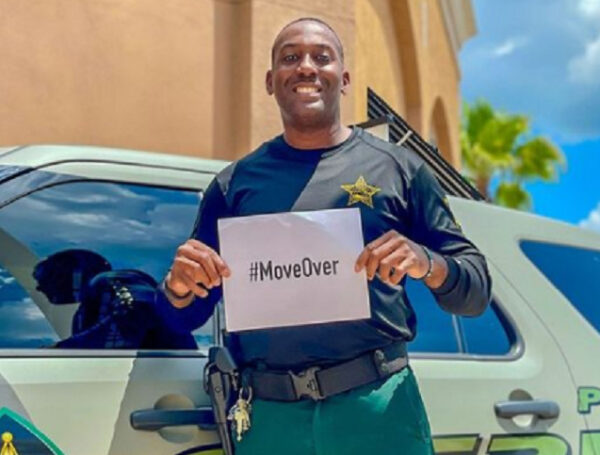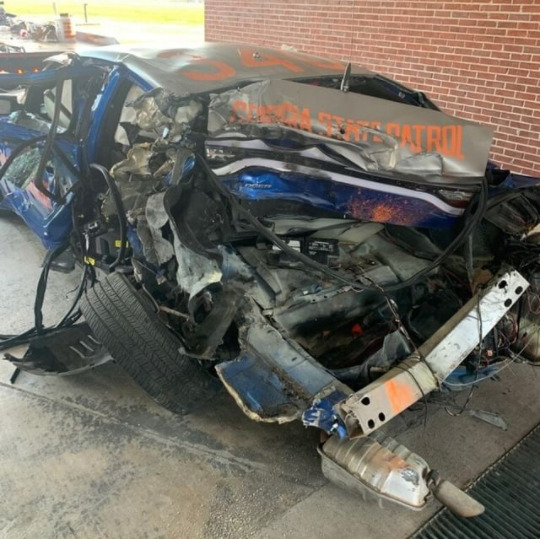
Harm’s way is no stranger to cops, and it is right outside the door of any police cruiser pretty much anywhere during duty hours. Whether situated in the shoulder on an interstate or traversing through an intersection on routine patrol or responding to a call for service, traffic woes remain prevalent.
Although these instances are preventable by driver alertness, cops are still encountering distracted drivers swiping or direct-hit colliding with fully marked and brilliantly lit police cars…despite enacted Move Over laws. Heck, states’ Transportation Departments even display LED signs overhead interstates and other thoroughfares to remind motorists to Move Over when approaching public safety vehicles.
Still, crashes occur. And, like just about every other traffic-related issue, they are avoidable. Endemically, driver attention is crucial. Said another way, distracted driving is nothing shy of an epidemic, even where “hands free” laws exist.
A Georgia State Patrol trooper was one of the latest LEOs doing his job when…kaboom!
According to a Georgia Department of Public Safety press release accompanied by the picture below, Trooper First Class Wright “was working in an off-duty capacity on Interstate 75 in Tift County. TFC Wright’s vehicle was struck from the rear by a tractor-trailer that failed to move over, forcing TFC Wright’s [fully marked patrol] vehicle to strike the guardrail. Luckily, he only received minor injuries.”

(Photo courtesy of the Georgia Department of Public Safety.)
With the grace of God, that is one law enforcement officer who was granted a roadside miracle. Who would not have expected tragic news upon viewing the twisted hunk of metal pretzeled by an 18-wheeler? That trooper is super fortunate to not only survive but recoup from the stun and continue the run of public safety initiatives, especially enforcement of traffic laws such as the paramount one: Move Over.
The Georgia DPS announcement started with “We ask you to Move Over.” Asking, again/still, like every other jurisdiction seems to compellingly do. That implies a lax attitude of some operators of motor vehicles. It also signifies plain ignorance of traffic laws written to safeguard the motoring public—including cops.
When Florida legislated its Move Over law many moons ago, a statewide initiative ensued to educate the citizenry of the new statute. Besides print and broadcast media publishing the details of the Move Over Law, police officers blitzed a 30-day PSA, essentially distributing state-supplied pamphlets announcing the law and explaining the penalties for drivers who were found to be in violation.
As part of a traffic task force of sorts, a slew of officers concentrated on our city’s major arteries, especially near the business district and interstate proximity (where many traffic violations observed in the city generally wound up, tons of autos zooming by).
The 30-day educational effort by cops was a lengthy grace period before enforcement actions ensued: A fair deal.
I recall many drivers stopped for other traffic infractions stating they were unaware of the Move Over Law. “Never heard of it,” they said. My response was handing each of them a tri-fold pamphlet with basic diagrams and diplomatic dialogue explaining the statute and its importance to especially LEOs trying to do their job without being pancaked by a driver whose mind was elsewhere.
With typical anti-police attitude (even back then, but not as bad as today), some drivers handed back the pamphlet. Accustomed to arrogance (like any other cop), I politely said have a safe day and walked back to my cruiser (leaving the Move Over info in their hands) as other motorists whizzed by. Irony.
Some of those pamphlets were found down the road a bit, littered on the asphalt shoulder not far from where the traffic stops were conducted. So as to discern the variety of human nature, most of those stops during the PSA period were addressed with warnings for the initial reason for the stop, thus an operation with a double-gimme for auto-operator benefactors.
Sadly, only during the initial quarter after the Move Over Law went into effect our cops witnessed what appeared to be compliance, mostly. It is highly likely the gross use of cell phones is one major cause for Move Over violations, then and now.
Today, the Move Over Law is largely ignored, often resulting in tragedies:
PFC Wright’s situation in Georgia was reportedly due to a trucker falling asleep at the wheel. Despite federal transportation regulations stipulating truckers’ rest periods, judgments still go sideways—in Trooper Wright’s case, literally.
As the Georgia Department of Public Safety concluded their press release regarding the miraculous survival of TFC Wright, “Please Move Over for First Responders!” That seems like an annual presser after tabulations of police statistics reflecting the consequences of poor driving behaviors mowing down cops and other first responders.
Our brother and sister LEOs serving with the Pasco County Sheriff’s Office in Florida also remind us: “Crashes due to Move Over violations are 100% preventable. Don’t put the safety of law enforcement, first responders and service providers at risk – Move Over!”
Besides public safety officers, the mention of “service providers” means tow truck operators, public utility workers (cleanup, signage, light-pole maintenance) and construction crews working on the highways and byways. As mentioned in the brief video above depicting North Carolina’s Move Over predicaments, other states have recently expanded their version of the law to reflect pretty much all services present on motorways and/or significantly increased penalties.
Statistically, cops are most prevalent on America’s roadways and thus more often in the danger zone, which is why Move Over statutes were legislated. Many years later, to little avail.
How many more “Protect and Serve” messages on police cars must be crumpled by careless drivers? How many more cops do we needlessly chance killing by numbing our brains to basic driver responsibilities such as changing lanes and/or slowing to safe speeds when LEOs are visibly doing public safety work?
Even after roughly two decades of Move Over Law initiatives, tragedies are still occurring, many killing or maiming our police personnel conducting traffic enforcement, investigating crashes, or assisting motorists with mechanical problems/flat tires. Violators of Move Over stipulations exacerbate every cop’s situational awareness challenges. Talk about a head on a swivel, like an owl!
Motorists can easily help defray that factor by moving over or slowing when safely changing lanes is not an option.
I came across some material out of Maine where firefighters on roadside emergency response scenes were actually on the shoulder, standing near those big flashy red firetrucks, holding hand-held Stop signs ordinarily used by school crossing guards, purposed to slow down or literally stop the flow of traffic.
Also in Maine, cops have resorted to deploying a nifty device which is spooled like a role of ribbon and physically rolled out like traditional spike strips used by cops to defeat (deflate) bad actors who flee police pursuits. In similar design to spike strips, an inflated “speed bump” is stretched across the travel lanes to help force automobiles to slow down to safe speeds while public safety officials perform duties:
Next time you’re out their driving and moving over when you spot a cop doing his/her job, take note of what other motorists are doing (not doing). Seems astounding that we even need such a law in the first place, underscoring the lack of common sense among those possessing a license to tool around in an auto.
Let’s close with some thought-provoking nuggets. One decent thing the pandemic did for our law enforcement heroes is significantly lessen the motoring public by necessitating long-term lockdown: Reports indicate 2020 had far fewer Move Over Law violations.
That sound like how our penal code was intended, whereby all convicted criminals were locked away, off the streets, unable to inflict any additional harms upon law-abiding citizens—no ifs, ands, or buts.
Makes a case against those pesky liberal prosecutors issuing free passes and/or lenient-laden judges who push the penal book aside and play Mister Niceguy.
The same brand of leniency I often witnessed in traffic court, when defendant motorists in violation of the Move Over Law cited they were “unaware” of such a statute. Dismissed cases were as prevalent as the absent-mindedness of both the nabbed driver and the adjudicator who simply bought the lame excuse.